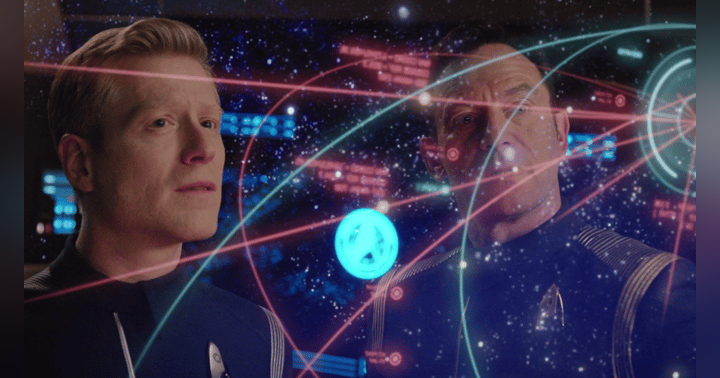The Catwalk of Professional Relationships

As you know, this blog exists to provide leadership development through the lens of Star Trek. Each episode we analyze usually holds within it multiple leadership examples that we can learn from. Unfortunately, that is not the case with The Catwalk from Enterprise. In this instance, the leaders offer a lesson in what not to do. It’s basically a dud of an episode. Luckily for you, I’m taking creative liberties to capitalize on Captain Archer’s missed opportunity by doing a fan rewrite! The main setting of this episode is the ship’s catwalk. The entire crew is taking shelter due to a massive storm that threatens to kill them with incredibly high radiation levels. All 83 crew members are together, in the same space, for eight days. What an opportunity! In the real episode, Archer does pretty much nothing. A huge misstep in my estimation. So let’s pretend that Archer is a strong leader that sees this as the opportunity that it is to build up one of the most valuable assets of any team: relationships.
In my rewrite I imagine Archer strolling through the catwalk looking for people to connect with. He stops here and there, intentionally having conversations with those he doesn’t know well. He listens, jokes, asks questions, and more. In the real version, a special area is set up for Archer to sleep in, away from the crew. In my version, Archer decides to “wander around, get to know the crew,” instead of bunking in his exclusive section. He also encourages T’Pol to do the same, “It’d be good for you to fraternize, a little”. Choosing to go out and share a space with the crew, instead of remaining separate, is a masterful move by (my) Archer that would go a long way in earning the trust and respect of his crew.
So why did I rewrite Archer from an aloof captain to a relational leader? Maybe this story will help. Many years ago I was an assistant manager. There was an issue going on between staff, the details of which I don’t remember. But the General Manager and I were talking with a staff member about the issue. The staff person said something about the GM being out of touch and not even knowing the staff. The GM responded with something I will never forget, “I don’t have to know the staff. Jeff does.” Jeff does?! Like that’s good enough?? Oh, it fires me up to this day and it was over 20 years ago! It’s not like we had 2,000 people working there. We had, maybe, 60! Sadly, my old GM is not the only leader who holds this type of view. But I’m here to tell you, it’s not ok. It won’t serve your people and it won’t serve your business. I went on to become a General Manager in that same company and that moment steered so much of how I led. I made it a point to develop a professional relationship with my team. And because of my efforts, I was able to leverage those relationships several times to everyone’s benefit.
Here’s one example. In this particular business, we had one day a year that was wildly busy. I had an employee who we’ll call Nathan. It was his first job and I could tell he was about to crack. I had gone out of my way to get to know him and develop a professional relationship based on trust. Because of this, I was able to pull him off the register for a second, just before he was about to blow. I dug deep into my ever-growing box of motivational quotes and said, “Pressure does one of two things. It either crushes you or it makes a diamond. And Nathan, I work with diamonds. Now let’s go shine!” Corny, I know. But it worked! He stepped up and we got through the day. It was awesome! I ran into him about 10 years ago and he remembered that moment too.
You are not alone if you struggle to balance developing personal relationships and maintaining a professional demeanor. This is not an easy skill to master, but it is powerful once you do. The first thing to keep in mind about these relationships is that they are professional. That does not mean personal stuff is off-limits. But it does mean that you don’t hang out all the time and share family photos with each other on Facebook. You need to connect on a meaningful level, but that connection should be rooted in trust and integrity. A fantastic framework to follow in cultivating professional relationships is the 5 dimensions of emotional intelligence. Self-awareness, self-regulation, motivation, empathy, and social skills. This is the perfect framework for any interaction, really, but will especially help maintain appropriate professional distance while connecting on a meaningful level.
Self-awareness: Be aware of how you are doing mentally, emotionally, and physically. What’s your emotional state? How present are you? How much energy are you bringing to work? Where are you at in regards to the relationship you’re developing? How are your efforts being received? Knowing these things informs the next dimension.
Self-regulation: If, for example, you are aware that you are wanting a more personal relationship with a member of your team, you can regulate yourself and reinforce your professional boundaries. This also helps you be more present with the person because you will be able to regulate where you are emotionally at the moment. As a professional relationship, it’s incredibly valuable to self-regulate your emotions and not take things personally. The goal is to lead well through relationships, not be liked or approved of at all times.
Motivation: A person with higher emotional intelligence will be motivated by things beyond or greater than themselves. The greater good, as it were. Being motivated by greater things like integrity and building trust will go far in developing a strong foundation for these relationships.
Empathy: Listening with empathy and compassion is invaluable. If you were to interact with someone that heard what you said, validated your feelings, and engaged with you on that same emotional level, you would feel amazing! That is exactly the type of relationship you would want to continue and grow (hello, retention rates).
Social Skills: Finally, utilizing appropriate social skills is vital to building quality professional relationships. Appropriate humor at the right time, relevant topics, voice volume, being comfortable interacting with the person, and more. In other words, how are you at reading the room? Strong social skills are the skeleton that all the other dimensions of emotional intelligence connect to when you’re working to develop meaningful relationships.
10 years ago I managed an amazing team! I had invested quite a bit of time connecting with every member of our 40 person team. I wanted to get to know them and build trust with them. It was an intentional activity that I worked on every day. One day, I over-committed the team in a very public way. I told our client we could increase our output by about 10%, completing our work faster than we currently were. Oops! Here was my chance to leverage the relationships I had built. I pulled the team together to explain what I did. I was honest with them about what I had done and I apologized.
And then I asked for a favor.
I asked my team to give 110% for 6 months. I figured we could over-deliver for a while, then settle back down, and our client would be ok with our processing times. I also knew that once we raised the ceiling on our production, we’d continue to create at a higher level even when we returned to normal. I told my team it was ok to say no. I couldn’t force them to do this. But if they could, as a personal favor, it would mean the world to me. This is where that investment paid off. They totally delivered! It was awe-inspiring. And it was completely the result of me taking the time to develop meaningful relationships with my team. It even became an inside joke,
“How are you doing?”
“Oh, me? Just giving 110%!”
In my made-up version of this episode, Archer nailed developing professional relationships! He was a great leader who showed humility and connected with people in a meaningful way. In the real episode, not so much. So take a lesson from fake Archer, and not sci-fi TV Archer. View healthy, professional relationships on your team as the incredible asset that they are. Make them a priority in your day, knowing that everyone wins when a team is filled with quality relationships.
This post contains affiliate links. I may receive a commission for purchases made through these links but it won't cost you any more.


